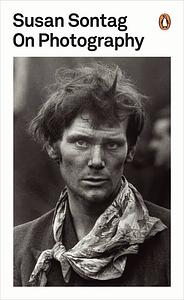You need to sign in or sign up before continuing.
Take a photo of a barcode or cover
I really enjoyed the more general, philosophical aspects of this; the discussions of specific photographers and their work less so.
Sontag interestingly provides keen observations on the interplay between photography and reality. Photography simultaneously as a means of capturing life and altering it, immortalizing it and reckoning with mortality. Its aid in the proliferation of consumerism, conferment of importance on the seemingly banal, reality as its pale comparison, its anesthetizing effects on emotions, and as a tool of the maintainance of social, racial and class divides are just some of fascinating connections made with images in this extensive work.
like the most lucid profound writing ever but also so so conceptual/abstract. definitely some highlights and some low points.
favorites were 'In Plato's Cave,' 'Melancholy Objects,' & 'The Heroism of Vision.'
recommend!
favorites were 'In Plato's Cave,' 'Melancholy Objects,' & 'The Heroism of Vision.'
recommend!
Fantastic general essay. I can see myself going back to this for reference, and there were a lot of great statements that stuck out to me
That being said, these were in between some problematic generalisations about Chinese people and obsessions with little people, so readers should be warned.
That being said, these were in between some problematic generalisations about Chinese people and obsessions with little people, so readers should be warned.
informative
reflective
slow-paced
Hard to follow the writing sometimes because it’s so dense and often feels like Sontag is using vocabulary just to prove her mastery of verbiage.
The salient points in her essay still hold true: photography has changed the way we relate to reality, image proliferation is paramount to capitalism and inherent in the way we consume images, there is always a push-pull dynamic of objective documentation versus subjective observation in the process of photography.
Sontag is repetitive and sometime contradictory in her essays. And she gets weirdly anti-Chinese in the last one. Making it seem as though the Chinese governments use photography as propaganda is the only way the Chinese people use photography. And that the “American” ideal of photography was somehow more artistic and indicative of “freedom”. As if Chinese artists didn’t exist or that Chinese people were all a monolithic reflection of their government.
Can you tell that the last essay pissed me off?
The salient points in her essay still hold true: photography has changed the way we relate to reality, image proliferation is paramount to capitalism and inherent in the way we consume images, there is always a push-pull dynamic of objective documentation versus subjective observation in the process of photography.
Sontag is repetitive and sometime contradictory in her essays. And she gets weirdly anti-Chinese in the last one. Making it seem as though the Chinese governments use photography as propaganda is the only way the Chinese people use photography. And that the “American” ideal of photography was somehow more artistic and indicative of “freedom”. As if Chinese artists didn’t exist or that Chinese people were all a monolithic reflection of their government.
Can you tell that the last essay pissed me off?
emotional
inspiring
reflective
medium-paced
Really quite incredible to view the photograph in relation to social theory. Wonderful to pair with terrorist assemblages—quite the overlap
Great re-reading, but the bit about "the Chinese" and their use of photography is a condescending vaguely Orientalist hell of a read in 2024
"needing to have reality confirmed and experience enhanced by photographs is an aesthetic consumerism to which everyone is now addicted. industrial societies turn their citizens into image-junkies; it is the most irresistible form of mental pollution. poignant longings for beauty, for an end to probing below the surface, for a redemption and celebration of the body - all these elements of erotic feeling are affirmed in the pleasure we take in photographs. but other, less liberating feelings are expressed as well. it would not be wrong to speak of people having a compulsion to photograph: to turn experience itself into a way of seeing. ultimately, having an experience becomes identical with taking a photograph of it, and participating in a public event comes more and more to be equivalent to looking at it in photographed form. […] today, everything exists to end in a photograph."
tenho algumas infinitas coisas para dizer sobre esse livro. que não são nada quando comparadas com tudo que sontag disse aqui.
muito muito especial
5/5
tenho algumas infinitas coisas para dizer sobre esse livro. que não são nada quando comparadas com tudo que sontag disse aqui.
muito muito especial
5/5
با تصوری که ازش داشتم خیلی فرق میکرد؛ بیشتر روی نکوهش عکاسی و جایی که عکس توی دنیای امروز داره و تغییر و کمرنگ کردن واقعیت، مانور داشت. اما تجربهی جالبی بود خوندنش، دید دیگهای به آدم میده و ممکنه عکس گرفتنهای بعضاً بیخود روزمره رو از سر آدم بندازه؛ که کاش جای این، کاری برای کلیشههای اینستاگرامی با موضوعات ثابت میکرد.
Insights from 1977 that feel even sharper almost 50 years on, but beyond the scope of photography itself w/ the rise of social media, AI, the breakdown of subcultures into micro-aesthetic-cores… and highkey required reading for me as someone with 200 GB of icloud storage, a camera roll that gets 50+ pinterest-ready pictures every time I step outside, and 4 hours daily screentime on instagram where I post monthly photo-dumps. It’s hard to reflect on this image addiction without reminding myself of an out-of-touch newspaper comic or a melodramatic ‘phones bad’ short film—these works get taken up by social media, whatever emotional insights in there are destroyed by the algorithm—but Sontag’s writing does gives me some food for thought. Maybe I’ll put my camera down for once!









